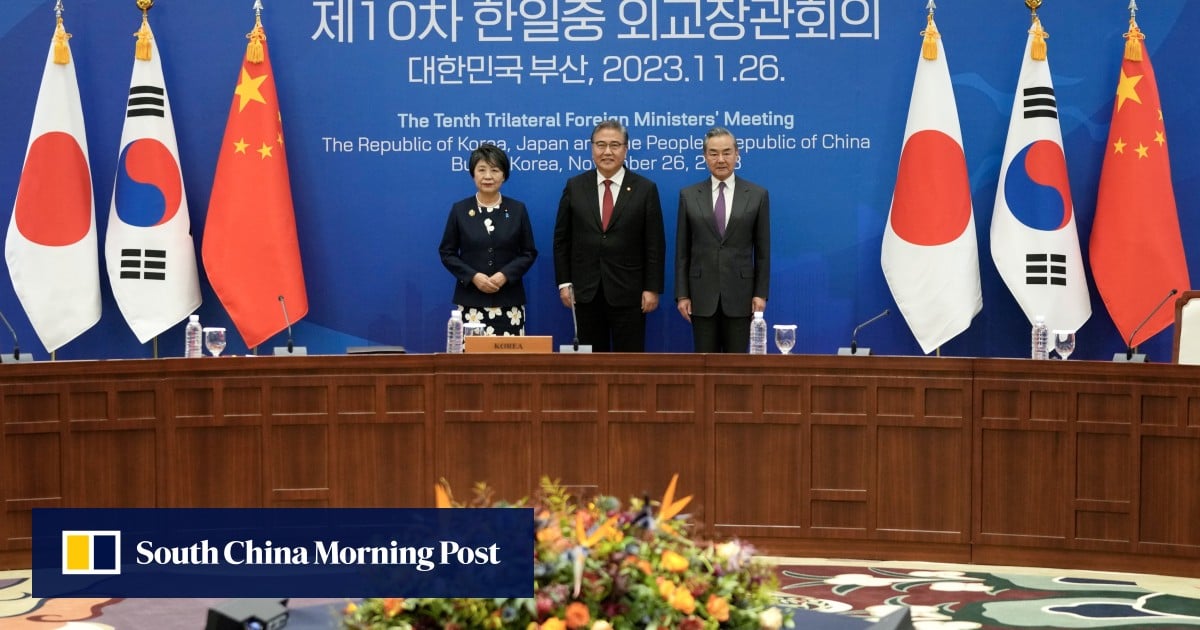“[Japanese investors] and the Koreans are facing the same challenges of balancing geopolitical challenges with efficiency,” said Jayant Menon, a senior fellow at the ISEAS-Yusof Ishak Institute in Singapore.
China is still a ‘huge market’ for Japan exporters even as trade slackens
China is still a ‘huge market’ for Japan exporters even as trade slackens
Japan and South Korea remain important trading partners and investors in China despite shifting their export business away from the world’s second-largest economy over the years amid rising costs
Japanese and Korean advanced technology companies are still key targets for some of China’s local governments, who hope to leverage historical and geopolitical ties to find new foreign investment opportunities.
Kong Fanping, mayor of Weihai, a city in eastern China’s Shandong province, led a team of over 100 Chinese business representatives to meet with companies from Japan and South Korea in November to promote investment and trade.
Kong told Japanese businesses during the week-long visit that they should consider increasing investment in China with a focus on “high-quality development in manufacturing”.
He extolled the Korean entrepreneurs of Weihai’s geographic proximity and existing business ties, according to a press release from the municipal government on December 6.
Beijing hopes that a free-trade agreement with Japan and South Korea could help strengthen investment and supply chains for semiconductor production and car manufacturing.
But growing pressure to diversify away from China, as well as a weak economic outlook, are seen to be discouraging Japanese and South Korean firms.
Direct investment from Japan to China in the first nine months of last year reached 3.934 trillion yen (US$27.9 billion), down from 9.612 trillion yen over the same period of 2019, according to the Japanese Ministry of Finance.
Uncertainties related to the operation of our semiconductor manufacturing lines in China have been significantly removed
Korean investment in China over the first half of 2023, meanwhile, dropped by 77.4 per cent to US$1.24 billion, the Ministry of Economy and Finance in Seoul said.
The United States has hobbled China’s tech hardware capacity by curbing shipments of artificial intelligence chips and chip-making tools.
“Through close coordination with relevant governments, uncertainties related to the operation of our semiconductor manufacturing lines in China have been significantly removed,” a Samsung spokesman said, confirming a statement it made on the US government waiver in October.
“We will continue to work closely with all relevant governments to maintain a stable supply chain for the global semiconductor industry.”
US subsidies and laws, including the 2022 Chips and Science Act, have steered some Japanese investors away from China at least as far as Southeast Asia, Menon said.
Officials in Tokyo are also advocating more “diversification”, meaning Japanese firms need to strike a balance between China and the US, Menon added.
Like other foreign investors, Japanese and South Korean firms that want to capture China’s demand for their products and services are thinking twice about reinvestment given the weak economic outlook.
Sumitomo Heavy Industries found that China’s “slowdown” affected sales last year, company media liaison Fukuoka Shi said.
Our policy is to refrain from investing in China, assuming that the Chinese market will not recover in the next few years
He added that sales of moulding machines and hydraulic excavators had particularly slowed in China, while the company’s investment had decreased.
“Our policy is to refrain from investing in China, assuming that the Chinese market will not recover in the next few years,” Shi said.
Chinese companies are also under pressure from competitors offering similar products and services, according to Joo Yong-sun and Kim Song-ok, Shanghai office managers for the Korea Trade-Investment Promotion Agency.
“Most Korean firms are leaving China because of fierce competition as Chinese companies are getting mature and have a better understanding of what consumers and the government want,” the managers said.
They said companies that leave are unlikely to return.
China also wants to see more investment into the financial sector, however, Japan’s Mitsui Sumitomo Primary Life Insurance has no designs to start operations in China, IT promotion department general manager Atushi Mogami said.
He pointed to “geopolitics”, and said that since the company already has US connections, it sees it as more “cost effective”.
There are some foreign firms who find out about new rules only after directly being fined or when the government begins to do enforcement
Li Zhenghe, business expansion head with the China office of ship certification agency Korean Register of Shipping, said that Korean companies do not always know how to comply with new rules or find local governments unable to explain the regulations in China.
“There are some foreign firms who find out about new rules only after directly being fined or when the government begins to do enforcement,” he said.
Large or small Korean companies also do not mind investing in India, among other “less explored” markets, Menon noted.
As South Korea clings to shipbuilding secrets, China must ‘turn somewhere else’
As South Korea clings to shipbuilding secrets, China must ‘turn somewhere else’
But China still has sway as a manufacturing centre that can produce goods for investors at a low cost, he added, as they still recognise China for “efficiency”.
And Shandong University researchers Yang Yanlong and Ye Rujing see common ground among the three nations in creating a stable regional supply chain.
“The Regional Comprehensive Economic Partnership (RCEP) agreement has significantly reduced intraregional trade barriers, will promote the circulation of new energy raw materials, open up sales channels and promote the cooperation and development of the three countries in the field of new energy,” the researchers said.
China, Japan and South Korea are all signatories of the 15-nation RCEP, which is the world’s largest free-trade deal. It started in January 2022, and also involves the 10 Association of Southeast Asian Nations members plus Australia and New Zealand.
Additional reporting by Frank Chen







